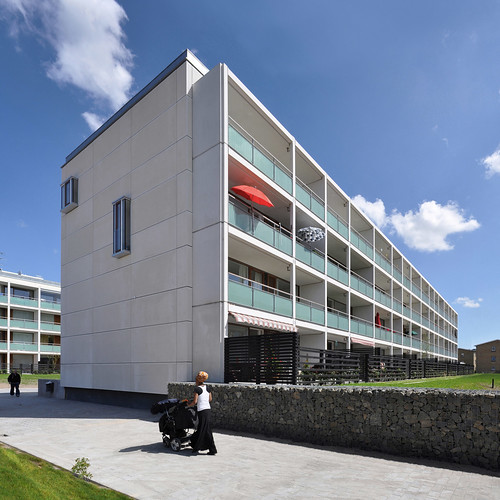renovation of gyldenrisparken social housing, copenhagen. vandkunsten/witraz/wissenberg 2005-2012

Image by seier+seier
renovation of gyldenrisparken social housing, copenhagen denmark 2005-2012.
architects and engineers: a collaborative effort by vandkunsten, witraz & wissenberg.
original architects: svend fournais and hans ole christiansen, 1964.
I worked on the competition for this project back in 2005 and, seeing that prince charles is visiting the place today (no, really), I thought if it is good enough for him, it is good enough for you guys.
we have been through a few discussions here on how to treat our modernist heritage, not least the troubled post-war housing projects which have seen such social decline since construction, and so many practical problems too, all while bearing the brunt of modern migration and its consequences, a drama still unfolding. there is plenty to talk about.
in denmark, we rarely demolish social housing, favouring physical renovation in combination with local social work, but more often than not, the renovation effort is done in a sort of hostility towards the original architecture. we know better. not very likely.
in a way, defending 1960’s plattenbau is about as backward as you can get in architectural conservatism, but the problem of what to do with these buildings, especially the ones that don’t immediately call for the protection of their unique architecture, is one of the central questions of our trade these years.
elsewhere, most notably in britain, a number of related buildings, considered classics by some of us, are being torn down and their sites redeveloped with a much higher density, suggesting that the shrill debate surrounding their destruction is partly driven by financial interests – that this most important subject is the victim of spin, and not from the people directly involved.
neither approach seemed attractive and it was with some trepidation that we entered the competition for an overall plan for the 1964 gyldenrisparken area, including new facades, combining smaller flats into larger ones, a new nursing home, and a new kindergarten. how should we respond?
it was obvious from our first visit, that the original architects hadn’t quite been the crooks "popular opinion" would have us think of that period’s practitioners. the plans were good, the green spaces generous, the buildings well-proportioned. and the scale was humane. don’t forget that copenhagen has just been through a horrid phase of 8 to 12-storey housing blocks in ørestad. none of that here.
the buildings we found, their exteriors in particular, were strangely devoid of details. anything that could be solved with pre-fab concrete was. balcony fronts were a single slab of concrete effectively blocking daylight from entering the flats. it is tempting to say that the architects were married to the concrete industry, but it is perhaps more correct that they were wedded to the idea of industrial production of architecture and that it occasionally got in the way of doing the right thing. but not always.
the available narratives did not fit. there were no victims, no perpetrators. no righteousness possible on behalf of the architects and, thankfully, no drama. plenty to be done, though.
and so, we proposed that the original architecture be respected; that after insulating the houses to a high, modern standard, we reclad them in white concrete. and that the biggest changes were to happen at detail level. one image we used during our discussions was that, looking only at the concrete, these blocks could have been by jacobsen or one of the other masters working in the thirties or fifties – that, in a sense, we had to bring them back in time to a period of more refined detailing. we were looking for a way of not imposing on the architecture we found. you’ll be the judge.
we won, by the way, and the work is almost complete. it has taken a while because the area of gyldenrisparken is large, as they liked it in the sixties. it is so large, in fact, that we were able to build a new nursing home and kindergarten there after clearing up secondary structures between the houses. we designed them as long meandering buildings that subdivide and qualify the green spaces.
all new construction was kept in two floors and clad in black wood for constrast and clarity. they have green roofs that retain rain water, and the kindergarten became our first passive house, done according to the strict, german passivhaus standards.
while this all sounds good, you have to wonder why the whole project was not done to those standards. ein passivhaus ist kein passivhaus, so to speak, but the copenhagen municipality wanted a showcase, nothing more, for COP 15, the failed climate conference they hosted in 2009. political tokenism at its worst, to my mind, and at its core one of the reasons COP 15 had to fail.
however, the filth of politics should not be allowed to detract from the work of decent people, and while the architecture of the gyldenrisparken renovation is so discreet as to be almost invisible (as in almost unpublished), there are other and better ways to measure its success. the rent remains low, meaning that people can stay on. there is no forced gentrification. yet the waiting list for future residents keeps growing. it used to take five months to get a flat in gyldenrisparken, it will take you five years now.
this photo was uploaded with a CC license and may be used free of charge and in any way you see fit.
if possible, please name photographer "SEIER+SEIER". if not, don’t.

26 Responses to renovation of gyldenrisparken social housing, copenhagen. vandkunsten/witraz/wissenberg 2005-2012